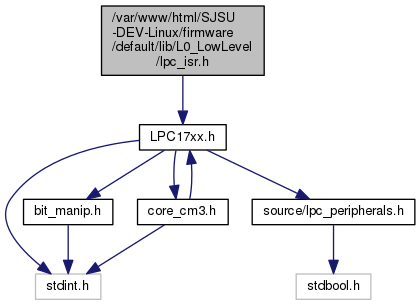Interrupt Service Routine (ISR) functions. More...
#include "LPC17xx.h"

Go to the source code of this file.
Enumerations | |
| enum | intr_priorities_t { IP_above_freertos = 1, IP_SYSCALL = 2, IP_KERNEL = 31, IP_default = 20, IP_high = IP_SYSCALL + 1, IP_low = IP_default + 1, IP_eint = IP_default - 9, IP_ssp = IP_default - 6, IP_can = IP_default - 5, IP_i2c = IP_default - 2, IP_uart = IP_default - 1, IP_watchdog = IP_default, IP_timers = IP_default, IP_pwm1 = IP_default, IP_pll = IP_default, IP_spi = IP_default, IP_rtc = IP_default, IP_adc = IP_default, IP_bod = IP_default, IP_usb = IP_default, IP_dma = IP_default, IP_i2s = IP_default, IP_enet = IP_default, IP_mcpwm = IP_default, IP_qei = IP_default, IP_RIT = IP_default, IP_pll1 = IP_default, IP_usbact = IP_default, IP_canact = IP_default } |
Functions | |
| void | isr_register (IRQn_Type num, void(*isr_func_ptr)(void)) |
Detailed Description
Interrupt Service Routine (ISR) functions.
Enumeration Type Documentation
| enum intr_priorities_t |
Interrupt Priorities (pre-configured by low_level_init.cpp) 0 - Highest 31 - Lowest
Interrupts used in this project must NOT use higher priority than IP_SYSCALL, so if IP_SYSCALL is set to 5, then interrupt priority must be higher number than 5 in order to set it to lower priority.
FromISR() FreeRTOS API cannot be called from interrupts that have higher priority than IP_SYSCALL, which means that:
- YOUR ISR must have numerically equal to or HIGHER value than IP_SYSCALL
The interrupts that use higher priority than IP_SYSCALL MUST NOT USE FREERTOS API. These higher priority interrupts (even higher than FreeRTOS kernel) can be used to specify "super" priority above everything else in the system.
| Enumerator | |
|---|---|
| IP_above_freertos |
FreeRTOS Interrupt Priorities Be careful changing these because interrupt priorities set below must fall in between these two priorities. |
| IP_SYSCALL | |
| IP_KERNEL | |
| IP_default |
Interrupt Priorities These are used at to set default priorities before main() is called. All interrupts use default priority unless otherwise stated in this enum. If you don't want interrupts to nest, set them to the same priority as IP_DEFAULTDefault priority of most interrupts, set arbitarily betweeen syscall and kernel |
| IP_high |
Higher than default, but lower than syscall |
| IP_low |
Lower than default |
| IP_eint |
Port0 and Port2 interrupt |
| IP_ssp |
SSP can be super fast, so needs higher priority |
| IP_can |
CAN can be fast, so use higher priority than other communication BUSes |
| IP_i2c |
I2C set to higher priority than UART |
| IP_uart |
UART set to higher priority than default |
| IP_watchdog | |
| IP_timers | |
| IP_pwm1 | |
| IP_pll | |
| IP_spi | |
| IP_rtc | |
| IP_adc | |
| IP_bod | |
| IP_usb | |
| IP_dma | |
| IP_i2s | |
| IP_enet | |
| IP_mcpwm | |
| IP_qei | |
| IP_RIT | |
| IP_pll1 | |
| IP_usbact | |
| IP_canact | |
Function Documentation
| void isr_register | ( | IRQn_Type | num, |
| void(*)(void) | isr_func_ptr | ||
| ) |
Register a callback function for an interrupt.
There are two ways to register an interrupt, one is to define the exact "IRQHandler" as the one defined at startup.cpp, so something like this: C++ (*.cpp) file: extern "C" void UART0_IRQHandler() {} C (*.c) file: void UART0_IRQHandler() { }
The second method is just to call this function and register your function as an ISR:
- Parameters
-
[in] num The IRQ number;
- See also
- IRQn_Type. Only IRQ 0-N can be registered.
- Parameters
-
[in] isr_func_ptr void function name.
- Note
- This function is implemented at startup.cpp since that contains the interrupt vector.
This function allows the user to register a function for the interrupt service routine. Registration of an IRQ is not necessary if the weak ISR has been over-riden.


 1.8.11
1.8.11